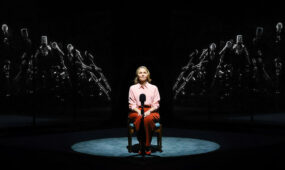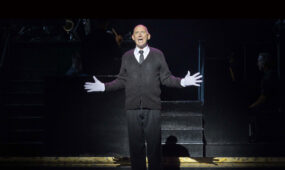La Traviata - opera with soul
Theatre

In the premiere of this new version, Giuseppe Verdi’s heart-wrenching love-gone-wrong opera is a lusty and beautifully engineered story.
One need not be an opera buff to appreciate the enthusiasm and many-varied excellence in State Opera SA, OperaQ and NZ Opera’s co-production. Originally subtitled A Woman Gone Astray, its 1850s moral underpinnings may seem a bit old-fashioned, but the story is still relevant in much of the world that is uneasily close to home.
The sorrowful opening strains – echoed in a later act – reveal the central female character Violetta (Elvira Fatykhova) as a ghostly figure somberly facing her earlier self. It is a brief and striking moment that sets us up for key elements of her back-story.
It also introduces some clever design work. Set and costume designer Christina Smith deserves a medal for her clever use of the space, including the large cube that acts as a room upon the stage at the Festival Theatre. All in black, the female members of the chorus in one scene were each distinctive and eye-catching without distracting from the vital red of Violetta’s costume. Add an accolade for lighting designer Matt Smith and his arresting use of chandeliers and string-lights.
The State Opera Chorus, under Timothy Sexton, seemed to enjoy accompanying the leads, and did it well. The well-known Brindisi drinking song was delightfully rendered, for example, setting the mood of Violetta’s reckless life, until she suddenly meets the overwhelmed Alfredo Germont?(Aldo Di Toro)?and is confronted with real love.
There is a fierce double standard at work in this plot, with Parisian party girl Violetta pursuing a forget-about-tomorrow lifestyle (she happily calls it “shallow nonsense”) which is both celebrated and dismissed by her fellow socialites. Her mistake is that she is not wealthy and, as a courtesan, is dependent on them – at least one at a time.
Complications arise. There is a rival to Alfredo in the form of current suitor Barone Douphol (Jeremy Tatchell), and the fact that Alfredo’s father, Giorgio Germont (Mario Bellanova), wants Violetta to give up his son for the sake of the family. Unwell, and under pressure, Violetta agrees. Giorgio praises the “noble”, Violetta but the jealous Alfredo thinks he’s simply been dumped.
The hedonistic crowd is fickle, condemning Alfredo one minute and comforting him the next. It would not be opera without sacrifice, remorse and death. One might think of Joy Division’s song “Love Will Tear Us Apart”, at least in relation to that title. Indeed, the opera’s refrain, “Love, mysterious and noble; the essence of the universe itself”, is often heard.

Get InReview in your inbox – free each Saturday. Local arts and culture – covered.
Thanks for signing up to the InReview newsletter.
It is a glorious musical soapie à la Moulin Rouge, with some remarkable voices and plenty of surging music courtesy of Nicholas Carter conducting the Adelaide Symphony Orchestra. As it roller-coasters towards a climax, La Traviata’s final section delivers a wonderful blending of voices, with Fatykhova’s soprano and Bellanova’s baritone especially compelling. The voices cease and a final curtain all too abruptly hides the dead Violetta and her grieving lover.
The surtitles (English for the singing in Italian) are rather high above the stage, but then I guess they are less distracting for some in the audience. This is a minor shortcoming, however. The opera is, in a word, brilliant.
La Traviata, a co-production between State Opera SA, OperaQ and New Zealand Opera, is on again on May 6, 8 and 10 at the Festival Theatre.
Support local arts journalism
Your support will help us continue the important work of InReview in publishing free professional journalism that celebrates, interrogates and amplifies arts and culture in South Australia.
Donate Here






Comments
Show comments Hide comments